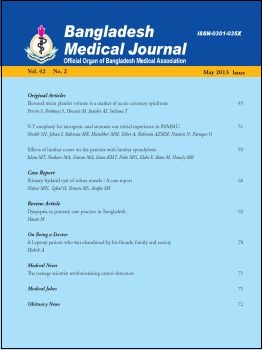Dyspepsia in primary care practice in Bangladesh
DOI:
https://doi.org/10.3329/bmj.v42i2.18989Keywords:
Dyspepsia, functional dyspepsia, Helicobactor pylori, peptic ulcer disease, primary care practiceAbstract
Dyspepsia generally refers to pain or discomfort in epigastric region. It is a common problem in the community and clinical practice. It affects quality of life, productivity and causes significant resources utilization. There are a number of different causes of dyspepsia which varies from country to country. But the commonest cause in all the countries is functional dyspepsia. Investigations needed to diagnose the cause of dyspepsia are many and treatment options also vary. Consequently different scientific bodies have issued guidelines regarding the management strategy of this common disorder. But the strategy should depend on local prevalence of Helicobactor pylori infection, available health care resources and underlying serious diseases. Most dyspeptic patients are managed by primary care physicians. In Bangladesh, investigation facilities are lacking in most parts of the country. Furthermore, eradication rate of H. pylori is low and recurrence rate is high. In this article, we have reviewed the current evidences and recommendations on evaluation and treatment of dyspepsia and discussed the preferred option in primary care settings in Bangladesh.
DOI: http://dx.doi.org/10.3329/bmj.v42i2.18989
Bangladesh Med J. 2013 May; 42 (2): 63-69
Downloads
255
387

